In ancient times many peoples were polytheists, that is, they worshiped various gods. If we study the Pantheons of the various cultures in depth, we discover several similarities, not only in the roles of the deities, but also in certain myths and legends, for example, those related to the creation of the world and the great deluge, as if a common thread linked the origins of all humankind.
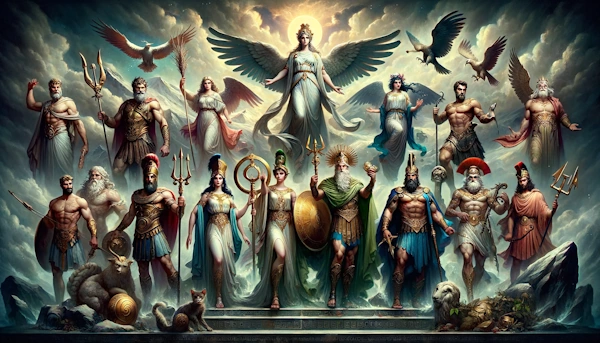
Quick Links
>> Why the Greek myths?
>> The Cosmogony (birth of the cosmos)
>> Zeus
>> Poseidon
>> Polyphemus
>> Dionysus
>> Apollo
>> Metis
>> Athena
Why the Greek myths?
In this article we will focus on the mythology of ancient Greece for two reasons; first, to provide context and acquaint the users of our Youth Wisdom Test with the characters that appear in the results. Second, because our staff admires Hellenic philosophical thought, particularly that of Socrates and Plato, which is also based on the knowledge and mythology of these people. Just like us, the ancient Romans were fascinated by Greek culture, drawing from this great civilization not only certain concepts but also the mythology. In the discussion, in addition to the characteristics of the Hellenic gods, we will also provide the corresponding Latin name.
Not a boring lesson, but entertaining stories
Should younger users find this examination too long, we recommend reading it a little at a time, as if it were a book whose chapters are being read every day. Our intent is to entertain and not to bore, so we will try to be concise and explanatory. Think of it as a series of short stories, not so different from the books kids are used to reading.
1. The Cosmogony (birth of the cosmos) of Hesiod
There are several theories in Greek mythology about the creation of the world. Here we will examine the theogony (i.e., the birth and genealogy of the gods) of Hesiod, a Greek poet.
Originally there were no stars, no Earth and no universe, only formless Chaos reigned, beyond time and space. Out of Chaos appeared Gaea, Mother Earth, primeval Deity and mother of all gods and all men. Gaea single-handedly generated Uranus, Deity of the heavens and firmament, who, by impregnating Gaea, the earth, led to the birth of the Titans, including Oceanus, Rhea, Mnemosyne, Thetis and Chronos. Gaea and Uranus were for a time the rulers of the entire universe.

1.1 The reign of Uranus
Uranus, disgusted by the appearance of his sons (like that of the Hecatoncheires, who had a hundred hands, and the Cyclopes, who had only one eye) and for fear of being ousted, plunged them all into the interior of the earth. Gaea, saddened, created from her entrails a sickle and urged her children to kill their father. Only the youngest of them, Kronos, agreed to do so. When, like every night, Uranus descended to earth to embrace his wife Gaea, Kronos emasculated their father with the sickle. The blood that flowed copiously from the wound fertilized Gaea, out of whom were born the Erinyes, the nymphs Meliads and the Giants. The seed of Uranus that touched the waves of the sea generated Aphrodite, goddess of love. Uranus escaped and never came near his wife, the Earth, again.
1.2 The reign of Kronos
The throne would have belonged to Oceanus, the eldest son of Uranus and Gaea, but Kronos by deception seized it and became ruler of the cosmos. Kronos freed his Titan brothers, but left the Cyclopes and Hecatoncheires imprisoned, and married his sister Rhea. Rhea and Kronos had numerous children including: Hades, Poseidon, Zeus, Hera, Demeter and Hestia.
Meanwhile, other Deities appeared such as Thanatos (Death), Eris (Discord), Nemesis (Retribution), Helios (Sun), Selene (Moon), and Iris (Rainbow).
1.3 The sons of Kronos
Under Kronos’ command, Earth experienced a golden age, but the tranquility ended when the ruler was foretold that his reign would end at the hands of one of his children. Terrified, Kronos began to devour them as soon as they were born, holding them captive in his bowels. With the last one, Zeus, Rhea brought him a rock instead of his son, but being wrapped in swaddling clothes, Kronos swallowed him without noticing. Zeus was taken to a cave on the island of Crete, entrusted to the care of the nymphs Melissa and Adrasteia and suckled by the goat Amaltheia. When Zeus grew up, he ascended to heaven and offered Kronos a drink prepared by the goddess Metis that made him vomit his children, then declared war on his father.
1.4 The Titanomachy (the battle of the Titans)
A long war began between Kronos, backed by the Titans, and his sons. Gaea suggested to Zeus that he should free the Cyclopes in order to form an alliance with them. So he did, freeing the Hecatoncheires as well. The Cyclopes, to thank Zeus for restoring their freedom, made weapons for him: thunderbolts (lightning). Zeus and his allies won the battle, Kronos was removed, and the Titans chained in Tartarus (the depths of the earth) under the custody of the Hecatoncheires.
1.5 The victory of Zeus
After the fight against the Titans, Zeus divided up the world by making a lottery with his older brothers, Hades and Poseidon. Zeus was given the heavens and the air, Poseidon the waters, and Hades was given the realm of the dead. The ancient earth, Gaea, could not be granted to any, but was shared by all three according to their abilities. Thus began the reign of Zeus, who chose Mount Olympus as the abode of the gods.
1.6 The battle between Zeus and Typhon
Gaea, who could not bear the idea of her Titan sons being imprisoned in Tartarus, asked her son Typhon, father of all winds, to wage war against Zeus, and he agreed. No one was as tall as Typhon, who had a hundred heads that spat fire. When he arrived on Olympus, the gods fled and only Zeus remained, who was defeated. Hermes, son of Zeus, messenger of the gods and Deity of trade, later healed and helped him, making him strong again. The father of the gods fought Typhon again, but this time he prevailed and imprisoned him under Mount Etna. A period of peace followed, and the gods were able to return to Olympus.
1.7 The Gigantomachy (war of the Giants)
Gaea then went to the Giants to wage war again against Zeus; they agreed because, according to prophecy, no immortal god would defeat them. Knowing this, Zeus called to arms, in addition to the Olympian gods, his son Heracles, who was simply a demigod. Heracles, after sprinkling his body with a magical herb, inflicted the death blow on all the Giants wounded by the other Gods, as he was not a true Deity. Zeus won the battle and was able to continue reigning forever.
2. Zeus
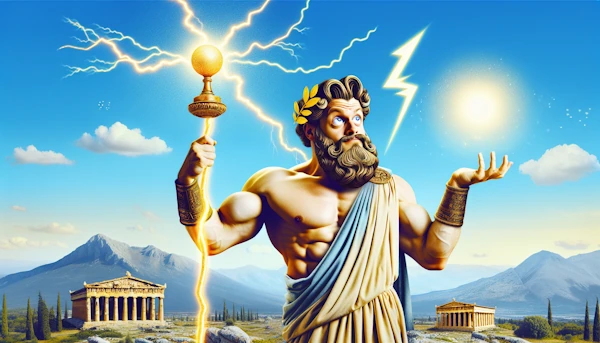
The symbols of Zeus were the thunderbolt, bull, eagle, oak, and olive tree. The equivalent figure in Roman mythology was Jupiter.
For the Greeks, Zeus was the lord of the heavens, the father of men and gods; he ruled over meteorological phenomena and distributed success or ruin. Precisely because of this cosmic centrality, he was the guarantor of universal order, the pivot of justice and the foundation of legitimate power. With his victory over his father Kronos, Zeus gained eternal power and laid the foundation for a new spirituality, teaching men true wisdom, which consisted of recognizing the positive value of suffering and relying on divine providence.
2.1 The sons of Zeus
In addition to being the symbol of justice on heaven and earth, Zeus was also seen as an incurable lover and seducer, becoming the father of mankind in a biological sense as well. Although Hera, patron goddess of marriage and children, was his lawful wife, Zeus had numerous mistresses and consequently many children. Often, to achieve his purposes and seduce his sweethearts, he carried out metamorphoses, transforming himself, for example, into a swan, a bull or a golden rain. A god, to be sure, but he too grappled with human weaknesses; in this way people could have a more direct relationship, feel closer to him, treat him with familiarity, thus managing to develop a deep faith.
Zeus was both the brother and husband of Hera. With her, he had Ares, Hebe and Hephaestus. The many conquests Zeus made among the nymphs and mortals initiated the most important Greek dynasties. His children included the twins Apollo and Artemis, Hermes, Persephone, Athena, Dionysus, Heracles, Helen, Minos, and the Muses.
3. Poseidon
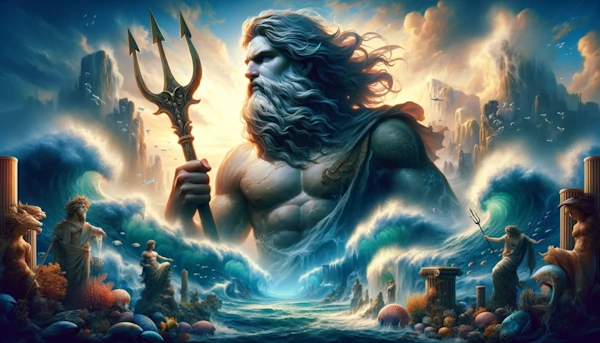
The symbol of the god Poseidon was the trident, and the animals sacred to him were the horse, bull, and dolphin. The Romans called him Neptune. He was the son of Kronos and Rhea and brother of Hades and Zeus. Poseidon was the god of seas and rivers, creator of storms and floods, and bringer of earthquakes and destruction. He lived in an amazing golden palace beneath the seas, beautifully adorned with corals and sea flowers. In Homer’s Odyssey, Poseidon became enraged and, in revenge for the blinding of his son Polyphemus, forced Odysseus to wander the sea for ten years.
He was perhaps the most destructive of all the ancient Deities, but he had not only a negative force; he was also the protector of sailors and horses.
3.1 The sons of Poseidon
After a long courtship, he married Amphitrite with the help of a dolphin who kidnapped her. As a sign of gratitude to the animal, Poseidon created a constellation with its form and name. Poseidon and Amphitrite’s most famous son was Triton, half man and half fish. Two other children of the couple were Rhode and Benthesikyme.
Like the other Deities, Poseidon fathered many other characters with various partners. The most illustrious were Theseus, the Cyclops Polyphemus, Orion, and the winged horse Pegasus.
3.2 The contention for the city of Athens
In the legendary competition with Athena to win the patronage of Athens, Poseidon offered the city a spring of salt water as a gift. However, the gift offered by Athena, an olive tree, won greater acclaim and she became the patroness of the great Greek city.
4. Polyphemus

Son of Poseidon and the nymph Thoosa, Polyphemus was a Cyclops, that is, a one-eyed giant. He fed himself on the cheese he made from the milk of his sheep. However, when strangers came to his vicinity, he devoured them mercilessly.
4.1 Polyphemus in the Odyssey
Homer narrated in the Odyssey that Odysseus, Greek king of Ithaca, on his long journey back from the Trojan War, disembarked in the Land of the Cyclops, where he reached and visited a cave. Curious to know the master of such a shelter, Odysseus decided to lie in wait. Upon hearing the earth tremble under the giant’s footsteps, the hero and his companions hid, but were soon discovered. Odysseus therefore stepped forward, asking the Cyclops for hospitality. Polyphemus grabbed and devoured four companions of the king of Ithaca and imprisoned the rest in the cave, intending to eat them one by one.
4.2 The “gift” of Polyphemus
Trapped with his companions in the Cyclops’ cave, the entrance to which was blocked by a huge boulder, Odysseus devised a plan to escape from Polyphemus. As a first move, he offered very sweet and very strong wine to the Cyclops to make him fall into a deep sleep. Polyphemus liked the wine so much that he promised Odysseus a gift, but asked him for his name. Odysseus, shrewdly, then replied that his name was Outis, that is “Nobody” (in Greek Outis had an assonance with his name, Odysseus). “And I will eat Nobody last of all his company, and all the others before him”, was the Cyclops’ gift.
4.3 The cunning of Odysseus
Polyphemus fell asleep deeply stunned by the wine, and Odysseus put the second part of his plan into action. For he and his companions had prepared a large stick made from an olive tree, which, when red-hot, was plunged into the eye of the sleeping Cyclops. Polyphemus screamed so loudly that he roused his Cyclops brothers from sleep. They ran to the door of his cave while Odysseus and his men hid near Polyphemus’ flock. The Cyclopes asked Polyphemus why he had shouted so loudly and why he was calling for help, and he answered them that Nobody was trying to kill him. The Cyclopes, thinking him drunk or in the grip of madness, recommended that he pray to his father for help and left him to himself.
4.4 The Escape of Odysseus
The next morning, as Polyphemus was letting his flock out of the cave to free them, Odysseus and the sailors escaped thanks to another clever ruse, which was part of the third part of his plan. Each of them clung to the fleece of a sheep’s belly to escape Polyphemus’s touch, as the Cyclops had placed himself in front of the cave door, probing each sheep on its way out to prevent the Greeks from escaping. Odysseus, the last to exit the cave, was clinging to the largest ram, the Cyclops’ favorite.
4.5 Odysseus’ mistake and Poseidon’s intervention
Noticing the escape of the travelers, Polyphemus pushed on to a headland, where he blindly began to throw rocks against the sea in an attempt to sink the ship. Here Odysseus made a mistake. At the Cyclops’ umpteenth blind throw, Odysseus, laughing, shouted, “Cyclops, if any man asks how you came by your blindness, say that Odysseus, sacker of cities, Laertes’ son, a native of Ithaca, maimed you!” thus revealing his real name. Polyphemus, who then learned of his identity, cursed him and invoked his father, Poseidon, begging him never to let him return to his homeland, or, if fate had foreseen his return, to make his voyage last for years, to make him lose all his companions and to find only misfortune in his homeland.
5. Dionysus
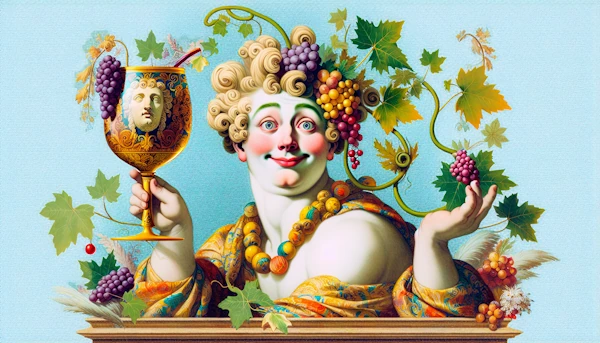
god of wine, drunkenness and madness understood as total surrender to the dark and mysterious forces of nature and the psyche, outside any rational control or moral discipline. Typical symbols of Dionysus were the thyrsus (wooden staff surmounted by a pine cone and adorned with ivy and vine shoots), the nebris (deer skin used as a cloak), and the mask. He was often represented with an ivy crown and with his cup, the Kantharos. In Rome he was known as Bacchus.
5.1 Instinct, madness and mutability
This Deity represented wild energy and the wildest, most animalistic and instinctive side of human nature; he was often responsible for cruel and merciless acts. The concepts of madness and delirium were also associated with him.
Dionysus was subject to constant changes and transformations; he was a “fluid” god with a multifaceted nature: masculine and feminine, animalistic and divine, tragic and comic. He embodied in his mystical delirium the primordial and instinctual spark present in every living being and also in civilized man; as his original and irrepressible part that could re-emerge and explode violently if repressed and not properly processed.
5.2 Birth and youth of Dionysus
According to the myth, he was born to Semele and Zeus in Thebes. When his mother died, falling into a trap set for her by Hera, Dionysus was transferred from Semele’s womb to Zeus’ thigh, in which his gestation was completed, then he was raised by the Nymphs. Once raised, Hera, still jealous and angered by her husband’s betrayal, struck Dionysus directly, plunging him into madness. From this episode originated his pilgrimages to various locations around the world. On his travels, which took him as far as India, Dionysus did not fail to spread his invention of wine and to claim his divine nature with all the peoples with whom he came in contact. In Syria he came across Damascus, son of Hermes, who opposed the spread of wine. The first real opponent of Dionysus was then tortured by the god himself and skinned alive.
5.3 Dionysian worship
The cult of Dionysus was widespread throughout Greece. Its adherents included mostly women (Bacchae or Maenads), but also semi-feline creatures (half-man, half-animal) such as Satyrs and Silens; this underscored the virtually subversive and alternative character of Dionysian worship.
The god of wine and intoxication had a large number of lovers, both women and men, although each of these predated his marriage to Ariadne.
5.4 Ariadne and Dionysus
Ariadne was the daughter of the king of Crete, Minos. When the young Athenian Theseus traveled to Crete with the purpose of killing the Minotaur (a half-man, half-bull monster), she fell in love with him and helped him out of the Minotaur’s labyrinth thanks to a ball of wool. Theseus returned to Athens with Ariadne, but then abandoned her on the island of Naxos. Awakening, Ariadne saw Theseus sailing away with the ship and wept wracked with grief. At Naxos she was found by Dionysus, who, struck by the young woman’s despair, decided to marry her, making her immortal. As a wedding gift, Dionysus gave Ariadne a golden crown created by Hephaestus (god of fire and metallurgy) himself, which, when thrown, turned into a constellation, the Corona Borealis, as an eternal sign of their love. Their marriage was noted as absolutely faithful, and Dionysus, once married, was always loyal to her. Several children were born of their union.
6. Apollo
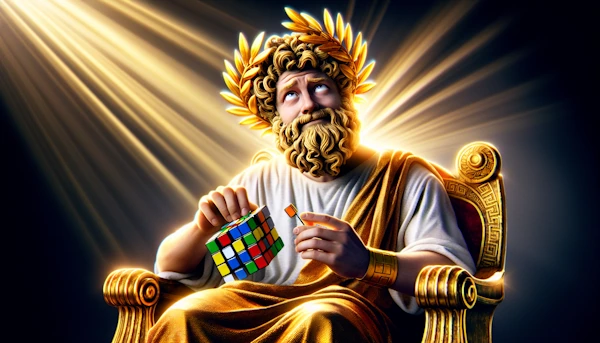
Apollo was the son of Zeus and Leto and twin brother of Artemis (goddess of hunting and the forest). His symbols were the zither (stringed musical instrument), laurel and bow. He also had the same name in Roman mythology.
He was the god of music, medical arts, sciences, intellect, and prophecy, as well as the one who pulled the chariot of the sun, escorting the burning star across the celestial vault. He was also known as Phoebus, literally “resplendent” or “shining,” referring to both his beauty and his connection to the sun.
As a god of the arts, Apollo was skilled in music and poetry, was surrounded by the Muses, and was their leader.
6.1 Apollo and the Oracle of Delphi
Apollo was also a skilled archer capable of inflicting terrible plagues with his weapon on the peoples who opposed him. Barely more than a child, he tried his hand at killing the dragon Python, his mother’s enemy, severely wounding him with his arrows forged by the god Hephaestus. Python took refuge at the oracle of Mother Earth at Delphi, a city so named in honor of the monster Delphyne, Python’s companion; but Apollo also pursued him into the temple and dared to finish him off before the sacred crevasse. Mother Earth, outraged, resorted to Zeus, who ordered Apollo to be purified in Tempe. Apollo, instead of going there, sailed to Tarra, Crete, where he performed the purification ceremony. On his return to Greece, he went in search of Pan, the goat-legged god of dubious reputation, and, after flatteringly wresting from him the secrets of the divinatory art, he took possession of the Delphic oracle and forced its priestess, called Pythia, to serve him. From that moment he became protector of the city and temple of Delphi and was worshipped as an oracular god. In fact, he was also god of wisdom and foreknowledge: he presided over contracts, oaths, and had oracles scattered all over the Greek world, in addition to the one at Delphi.
6.2 The unfortunate loves of Apollo
Apollo is credited with many and mostly unhappy loves. He fell in love with Coronis, from whom Asclepius, god of medicine, was born. With Cassandra, who received the gift of prophecy, but because she did not reciprocate the god’s passion, she was doomed to be unheard. She also loved boys, such as Cyparissus and Hyacinthus transformed after death into the hyacinth and cypress plants. Apollo, after falling in love with Hyacinthus, a handsome young prince, had to reject his many lovers, including Zephyrus, god of the west wind. One day Apollo and Hyacinthus had a discus-throwing competition in preparation for the Olympics in which the prince was to participate. Apollo threw first, but the discus, deflected in its trajectory by a gust of wind raised by the jealous Zephyrus, ended up hitting Hyacinthus in the temple, fatally wounding him. Apollo tried to save the much-loved teenager, employing every medical art at his disposal, but he could do nothing against fate. He decided, at that point, to transform the handsome boy into a flower of intense color, that of the blood Hyacinthus had shed from the wound.
6.3 Apollo and Daphne
His first and most representative love, however, was Daphne. Apollo, after slaying the serpent Python, boasted to Eros, the god of love, of his skill with a bow and arrow, claiming that the latter was instead too small and unfit to wield those weapons. The god of love then, in order to punish him, shot Apollo with a golden arrow, capable of making people fall in love, and the nymph Daphne, daughter of the river-god Peneus, with a lead one, which instead made them deny love. Inevitably, Apollo fell in love with the very one who rejected him. Once, as Apollo driven by ardent desire pursued her, Daphne sought help from her father, Peneus, who transformed her into a laurel tree. The god still feeling her heart beating under the bark, embraced and kissed her, deciding to make her his own tree. From that day Apollo made that plant evergreen and consecrated it. He took its leaves to create his crown; they would also later adorn the heads of victors and leaders.
7. Metis
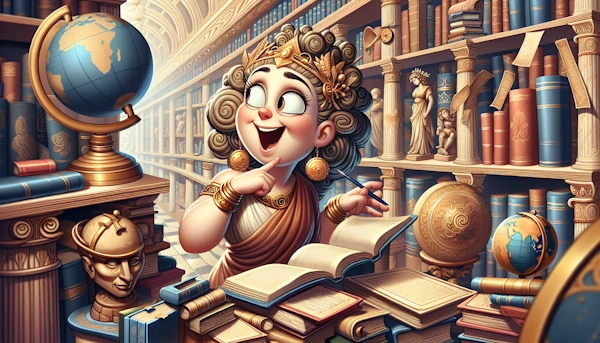
Meti was an Oceanid, that is, a daughter of the two Titans Oceanus and Thetis; she was also the mother of Athena. As a second-generation Titan, she was part of a powerful lineage that ruled the cosmos before the Olympian gods took over.
Goddess of cunning, wisdom, reason and intelligence. Not much is known about her, as her story was told peripherally in mythology. She often represented the voice of reason, guiding other Deities with her wisdom. Her powers were not limited to knowledge but could influence decisions, making her a valuable ally and a fearsome enemy. In Roman mythology she retained the same name, reflecting her unique position in the Pantheon.
7.1 Metis and the battle against Kronos
In Greek mythology, Metis, as the embodiment of wisdom, was able to influence decisions, strategies, and the very fabric of myths. It was she who helped Zeus save his brothers from Kronos, his father. Indeed, it had been foretold that one of the sons would dethrone the latter, killing him. Therefore Kronos, fearing this, devoured his progeny alive, the only one saved was Zeus. Metis, when Zeus was ready to challenge his father, handed him a powerful emetic (vomit-inducing drug) to give to the Titan, who vomited all his children, freeing them.
7.2 Metis and the birth of Athena
According to the myth, she was also the first mistress (and perhaps the first wife) of Zeus, but she did not give herself up easily to the god, transforming herself in a thousand ways in an attempt to escape him before surrendering. An oracle predicted that Zeus would be dethroned by a son he had with Metis, so after lying with her, he decided to devour her. In Greek mythology, intelligence and cunning were portrayed as multifaceted and ever-changing; Metis, in fact, was able to assume any form she wished. Zeus then induced her to transform into a drop of water and then swallowed her, but she was already pregnant. From that moment on, the goddess nested herself in Zeus’ brain, conferring shrewdness on him. In addition, she immediately began to make a helmet and a robe for the daughter she was carrying; the hammer blows she struck to make the helmet caused Zeus terrible pain in his head. Zeus sought help from Hephaestus, who managed to split Zeus’ immortal skull with a double-bitted axe. Out of the wound leaped the already adult and armed Athena, beginning to do a warlike dance. Thus Zeus emerged battered but alive from the ugly misadventure.
Despite her apparent demise, Metis’ wisdom continued to live on through Zeus and Athena. She was often thought to advise Zeus from within, thus maintaining her influence over divine and human affairs.
8. Athena
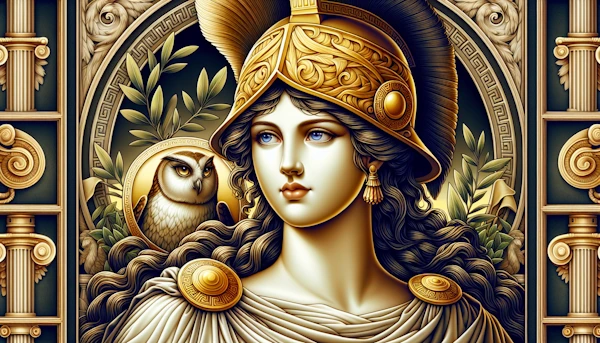
Athena was daughter of Metis and Zeus, born already an adult from the latter’s head.
goddess of wisdom, of the arts and strategy in battle. A warrior and virgin goddess, one of the most respected who held various functions: defending and advising heroes, instructing industrious women, guiding judges in the courts, inspiring craftsmen, and protecting children. But when she was in anger, she could become ruthless.
The goddess was always depicted dressed in peplos (Greek women’s white dress) and often armed. Her symbols were: the owl Athene noctua, the helmet, the spear, and the Aegis, that is, a shield covered with an indestructible cloak made from the skin of the goat Amaltheia, who had protected and fed Zeus. Her sacred tree was the olive tree, which she created as a gift to the Athenians to become their protector.
In Roman mythology she was called Minerva.
Athena, the wise and strong warrior, represented the intellectual qualities of both man and woman; in fact, she was also patroness of the female arts, spinning and weaving.
8.1 The astuteness of Athena
Athena, throughout the various myths, often displayed the wisdom and cunning inherited from her mother, Metis, making her one of the most revered Olympian Deities. When she came across a mortal who was spiritually kindred to her, Athena became his faithful friend and loyal companion. Many heroes received her support in their most arduous endeavors: Perseus in his struggle against Medusa, Bellerophon in the taming of Pegasus, Heracles in his effort to hold up the vault of heaven. According to Homer, in the Odyssey Athena was an important adviser to Odysseus, as the goddess recognized in the hero her own gifts of intelligence and perseverance.
8.2 Athena and Perseus
Athena was at Perseus’ side when he had to face Medusa, the only one among the three Gorgons who was mortal. Athena detested the young Medusa because, proud of her own splendid hair, she had dared to compete with her in beauty. Offended, the goddess had mutated Medusa into a foul creature and her hair into a tangle of serpents, so that anyone who crossed her gaze would be petrified. The hero received magical tools to enable him to confront her, including the shining shield given to him by Athena, through which he could look at Medusa without being petrified. With the helmet of Hades, which made him invisible, the winged footwear and the magical saddlebag where he could hide Medusa’s head, Perseus accomplished his feat thanks in part to Athena guiding his hand.
8.3 Athena and Arachne
Athena could be very revengeful, as in the story of Arachne. This was a woman of humble origins who one day boasted that she was a better weaver than Athena. The goddess thus went to her disguised as an old woman and advised her to repent of her arrogance (hubris), but the woman instead continued with her insolence and was ready to challenge the goddess of weaving. Athena then reassumed her true form and accepted the challenge. She made a tapestry depicting the gods punishing men, particularly the clash between Poseidon and the city of Athens, while Arachne made one in which Zeus was mocked with his many mistresses and the deceptions of the other gods were shown. When Athena saw that Arachne had not only insulted the gods but had made a more beautiful work than her own, she was outraged. She reduced Arachne’s work to shreds and struck her in the head three times. Terrified and humiliated, Arachne hanged herself. The goddess, moved by compassion, decided to turn her into a spider, obliging her to weave her web for eternity and pass on her knowledge to her descendants.
Conclusion
These are the characters from mythology that appear in our Youth Wisdom Test; in reality there are many more, and certainly no less interesting. If you enjoyed this article, you may want to do some more research on Greek or Roman mythology. If, on the other hand, you would like to get more insights into ancient Greek thought, read this article: The origins of our motto: Gnōthi Seauton – Nosce Te Ipsum – Know Thyself.
We hope we have intrigued you and prompted some food for thought.
Remember that the journey to awareness and awakening begins with a search, with learning new things and asking yourself questions. A long path, but one that will lead you to great achievements. Try our personality tests to know your level of awareness and your mental age. Have fun!
TAKE THE AWARENESS TEST
TAKE THE MENTAL AGE TEST
MINI SELF-EVALUATION TEST: ARE YOU A CURIOUS PERSON?
Read the sentences below and select the ones you agree with and that you think make the most sense.
Count the number of boxes checked and read the corresponding profile.
0: Curiosity is not your thing
1-2: You are a scarcely curious person
3-4: You are an average curious person
5-6: You are a really curious person
